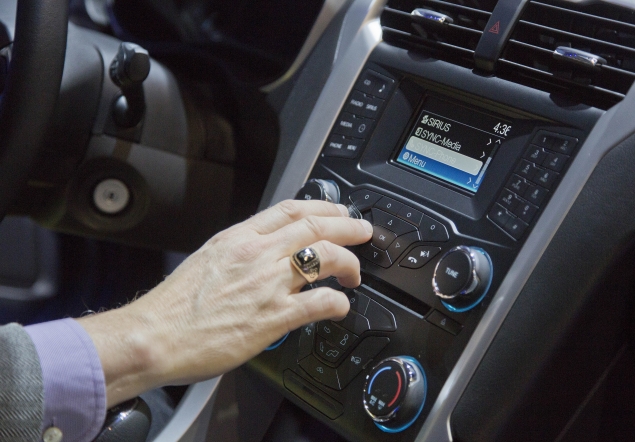
Automobile giants at the world's biggest mobile fair are showing off a new technology that turns a car into a smartphone accessory, allowing a driver to use cutting-edge apps without veering off the road.
Called MirrorLink, and adopted by 85 big manufacturers from Ford to General Motors, Chrysler, Nissan, Honda, Hyundai, BMW, VW, Fiat or Renault, it connects a smartphone and car entertainment system with a two-way audio, video and data link.
"People are using their smartphone applications and services 80 percent of the time. The other 20 percent when they are not using them is when they are in the car," said Jorg Brakensiek, technical coordinator for the Car Connectivity Forum.
"There is no really safe mechanism for the driver to do that," he told AFP at the Mobile World Congress in Barcelona, Spain.
MirrorLink requires a compliant car entertainment system and a smartphone with the software, which can be downloaded.
Drivers then can access their favourite apps.
The apps must meet legal requirements for screens that face drivers, for example the text must be a certain size and some functions such as typing must be disabled while the car is moving.
"The basic assumption is that the phone comes with the application," said Brakensiek.
"You use the car as an accessory."
Eventually, the MirrorLink technology will feed other data from the car to the smartphone, such as speed, location and even weather. That information can be used to develop new applications or improve other services, such as traffic news.
The Car Conectivity Forum, which groups nearly all car manufacturers, was set up to develop the technology two years ago.
The first MirrorLink compliant car entertainment systems have been released by the likes of Sony and JVC, for installation into existing vehicles.
The next step will be for manufacturers to build them into cars before sale.
The new technology avoids problems posed by the "smart car" in which manufacturers weld a SIM card into a vehicle so as to offer driver services such as navigation, SOS response and door unlocking, as well as paid-for entertainment.
One challenge is that the SIM card built into the car ties the owner to one operator for the car's life up to 15 years. To overcome this, car makers are trying to agree on a standard way to program the SIM card by remote.
"From out point of view, remote SIM management becomes a key enabler, it becomes a game changer," BMW's project manager for telematic control units, Markus Kaindl, told a symposium at the mobile congress.
But there are other drawbacks, too.
Much of the hardware built into a car cannot keep up with the mobile industry's fast-pace developments, the car owner must pay for the SIM contract, and each manufacturer has its own platform for applications, making it difficult to attract developers.
Yet the "smartcar" services may live on alongside the MirrorLink technology, industry analysts said, especially in high-end cars.
General Motors, one of the leaders in the field with its OnStar service offering navigation and help for drivers, announced before the show it will embed 4G connectivity in all 2015 model cars in North America.
At the mobile show this week, it showed off an impressive concept car, a Cadillac, with all the latest connected gadgets.
It has streaming movies, dedicated apps, and a system that alerts an absent car owner that something has hit his car, and even lets him view the surrounding area on his smartphone via on-board surveillance cameras.

No comments:
Post a Comment